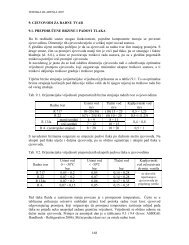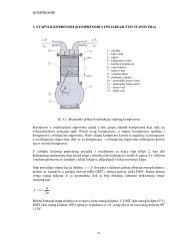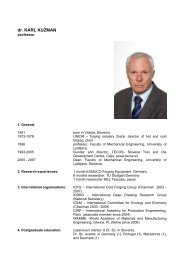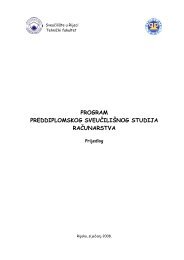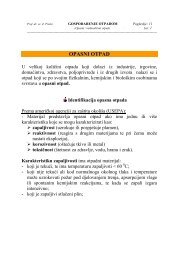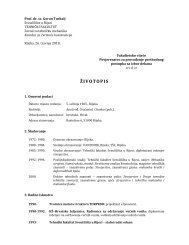universityâenterprise cooperation
universityâenterprise cooperation
universityâenterprise cooperation
You also want an ePaper? Increase the reach of your titles
YUMPU automatically turns print PDFs into web optimized ePapers that Google loves.
14<br />
The second collaborative mechanisms will be<br />
the enlarged VMnet network throughout the<br />
WBC region, supported by communication<br />
tools on WEB portal. The portal will provide<br />
well-timed information on all important events<br />
interesting for network members. Updated<br />
systematization of knowledge will be available<br />
on WEB portal. The increase in number of<br />
VMnet members, for 300 new members and 5<br />
new experts per year, is planned.<br />
The Training/service needs analysis<br />
will be undertaken in Serbia, Bosnia and<br />
Herzegovina, Montenegro and Croatia, to<br />
identify enterprises’ needs for advanced<br />
trainings and R&D services in the area of<br />
product and process development. Also, survey<br />
will cover analysis of labour market needs for<br />
vocational trainings of unemployed graduates<br />
in this area. The final goal is to determine<br />
knowledge and skills gaps, weaknesses and<br />
new competence requirements in regional<br />
enterprises, especially SMEs, and labor market.<br />
Based on conclusions of wide-ranging<br />
TSNA analysis, identified areas of advanced<br />
trainings and services for regional enterprises,<br />
PC partners will conduct competition and<br />
selection of national and regional expertstrainers<br />
and service providers, within WBC<br />
universities and research institutions. At least<br />
10 vocational trainings will be developed and<br />
implemented by experts-trainers. Teaching<br />
material for the developed trainings will be<br />
redesigned and prepared for setting up at<br />
MOODLE platform, supporting e-learning.<br />
All project partners will take part in<br />
development of Industrial Fellowship<br />
Programme (IFP), establishing sustainable<br />
partnerships between universities, enterprises<br />
and graduates, leading to mutual benefits.<br />
Highly qualified graduates (or employed<br />
engineers), as industrial fellows, will spend<br />
minimum 6 months to 2 years at University<br />
research centre, for professional development,<br />
participating in specific research projects<br />
targeted to industry needs and company<br />
business. They will work as part of enterprise,<br />
supported by a team of university experts –<br />
professors, teachers, researchers, who will<br />
bring out technical expertise, research, and<br />
innovation to the enterprise or the company.<br />
Industrial fellows will serve as «gatekeeper»<br />
for knowledge and technology transfer from<br />
university to their enterprises and provide<br />
excellent communication channels between<br />
them. IFP programme will define procedure<br />
for administration and management of the<br />
programme, conditions for qualifying of<br />
enterprise or the company, funding rules,<br />
requirements for graduates, obligations of<br />
university research centre and mentor, who<br />
will be responsible for the career development<br />
of graduates, and related services for<br />
enterprise, intellectual property rights (IPR),<br />
quality monitoring rules etc.<br />
Project partners will develop sustainable<br />
Practical Placement Programme (PPP) for<br />
students, providing them with the opportunity<br />
to gain practical experience in industry within<br />
the area that is related to their academic<br />
studies, and to develop their professional<br />
technical and interpersonal skills. Students<br />
thus have the opportunity to use their<br />
knowledge in practice and to tune it to the<br />
actual needs of the industrial environment.<br />
Established CTC centres and enlarged VMnet<br />
network represent the basis for continuation<br />
of activities after the project completion.<br />
WBC partners will use the equipment of<br />
CTC for education of students, vocational<br />
trainings, as well as for innovative services<br />
in virtual development of products and<br />
processes for regional enterprises.<br />
Virtual manufacturing (VM) system, which<br />
represents integrated computer-based model<br />
for product and process design, simulation<br />
of production processes, rapid prototyping<br />
and tooling, reverse engineering, is applied<br />
with the aim of:<br />
a) optimisation: design of products and<br />
processes, selection of materials for new<br />
products, process conditions and their<br />
tuning;<br />
b) reducing lead times and<br />
c) reducing time-to-market costs.<br />
Application of innovative VM technologies<br />
in the development of new and improvement<br />
of existing manufacturing processes in<br />
regional companies and SMEs will represent<br />
the key activator of productivity growth,<br />
and consequently of economic development







